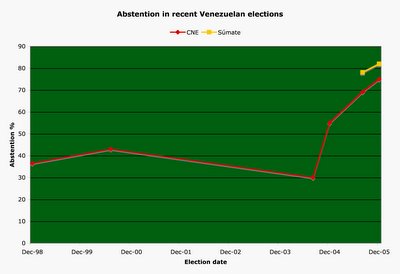
So we had 'perfectly normal' elections in Venezuela, as the CPM™ loves to say. It does not matter that the main opposition parties removed their candidates, it's quite normal after all. It does not matter that 100% of the legislative body is now pro-Chavez, democracies work that way. It does not matter that media sources were not allowed to photograph or show the lack of participation in the voting centers, freedom of expression is like that. It is irrelevant that the CNE was caught red handed lying in front of all international observers merely days before the election, voting arbiters side that way. It does not matter that 75% (the official number so far) to 90% (the initial estimates) of voters decided to abstain. And of those that voted, it does not matter that 20% decided to nullify their vote. It is irrelevant that government officials ordered all public employees to vote, or they would loose their jobs (more than 15% of voters). It does not even matter that 30% of the vote happened after 4PM time at which the poll stations should have closed in accordance to the Venezuelan law and to the agreement letter that the CNE signed with the international observers. So it must be a democracy after all.
But let me concentrate in that last detail for a second, the one that made me extra suspicious: 30% of voters cast their vote after the legal closing of polling stations. That single detail made me realize exactly how the government has managed to manipulate the vote since the RR. A recently reported study indicated the impossibility of 1.5 to 2 million extra votes in the last hours of the RR (which would on its own reduce the 18% victory of Chávez in the RR to a 5% defeat), based mostly on analysis of the data flow from the voting machines. The last election, also showed a long illegal delay in the closing of the voting centers, and showed abstention numbers smaller than most estimates. In this one the best source (Súmate) reports an 82.3% abstention to the government's 75% (a number that is sure to change in the near future, as I think that they have not figured out the actual numbers for the previous elections yet). So a full million extra votes (7.3% of voters) could have appeared in the oh-so-secure voting machines in that time. Add to this all the steps that the government used to obtain a large abstention figure in the RR, and reports of people that appeared to have already voted when they had not, and that explains it all.
I hypothesize that the misfeasance goes like this:- The voting process proceeds normally during the alloted time, with the normal number of non-voters (and of course the normal number of illegal voters sanctioned by the CNE).
- The CNE extends the voting time, to avoid the electoral centers from closing and printing out the final result from the machines
- The CNE sends new votes to the machines (which explains all the extra traffic seen during the RR)
- The voting process finally closes, with a brand new vote tally
This would explain why the 'finger-print catching machines' were necessary in the RR. They needed to: a)increase the number of abstentions in a process that has had the most participation in any Venezuelan election (by making the process slower and more complicated), so that this trick could work, and b)know exactly who had voted so that they would not exceed any machine total (as machines where assigned by ID card ending). Knowing who voted for whom is a nice little extra. Though this is quite inefficient (for anyone that knows about computers), it has the advantage that none of the voting software needs to be altered, only the data entry front-end, which can be made part of the operating system itself, and being that these are just simple Windows machines... need I say more?
So, going back to Sunday's plebiscite, I am inclined to believe Súmate's abstention numbers more than the CNE's, so let me re-do a graph that Miguel put up in his blog, but with Súmate's numbers for the last two elections in it (it's the most I can find), notice the 'phase transition' after the Referendum.:

Now, what was won with this abstention?: international attention to the lack of Democracy in Venezuela and a bit of confidence towards the Opposition parties. But let's wait and see what the international observers have to say about all this, after all the CNE violated their 'rules of the game' among other things by: delaying the closing of the polls and connecting a large number of machines before the closing of the polls (for such scheme to work, but it remains to be proven),
What is left for Venezuelans?. If we are very lucky this election will be nullified, and a fair election, without morochas, and without the current CNE will be organized. If we are not, the civil structures have to get organized and fast before the new National Assembly removes the only constitutional articles that would allow for a pacific end to the internal conflict. If we are very unlucky Chávez will just get rid of what is left of his Democratic façade and declare his dictatorship openly for all to see.
For further reading:
- High Abstention and Information Black-out in Venezuela Elections. Global Voices Online
- Bloggers get the scoop on Venezuela's disputed election. Robert Mayer
- RIP Venezuela's democracy. Aleksander Boyd
- A victory for Chávez?... Miguel Octavio
- The electoral analysis. Daniel Duquenal
- Euphoria Unhinged. Francisco Toro
- Venezuelans 'lost faith in polls'. BBC News
- Boycott of elections was right. U.S. Senator Bill Frist
No comments:
Post a Comment